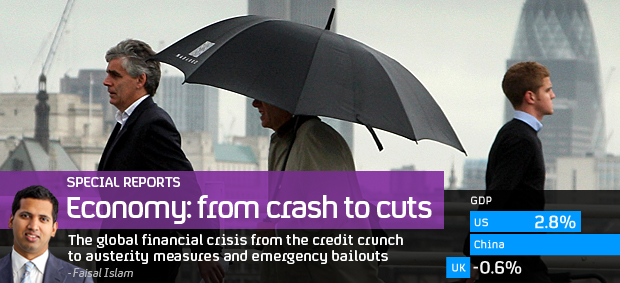What role will China play in the euro bailout?
An outline deal to save the eurozone has been agreed – but does it still need China’s input to succeed? Let’s hope not, because a top economist tells Channel 4 News the country may not be interested.
European politicians have clinched a deal – or at least, the beginnings of one – to fix the eurozone sovereign debt crisis.
The deal has three strands – forcing banks to take a writedown or “haircut” on Greek debt of at least 50 per cent; setting up a fund to recapitalise European banks, worth 106bn euros; and finally and most importantly, boosting the euro bailout fund (the European Financial Stability Fund, EFSF) to 1 tr euros, protecting other weak countries in the eurozone.
The details of the deal are still to be hammered out at further meetings of the eurozone’s finance ministers – but so far, the markets have responded relatively positively to what Channel 4 News Economics Editor Faisal Islam branded “the half bazooka”. You can read more in Faisal Islam’s “bazooka” blog, from Brussels, here.
It mirrors the shift of economic weight from west to east which has been ongoing for a number of years. Economist Dr Linda Yueh
However, what seems to have emerged is that there could well be a role for other countries in shoring up the euro. On the one hand, this makes sense, as one of the key elements of the eurozone crisis has been the fear that it could infect the global economy – when Europe sneezes, the United States and China catch a cold.
And it certainly explains why France’s President Sarkozy is calling China’s Hu Jintao today, and why the head of the EFSF is flying to China on Friday.
As Bloomberg TV’s economics correspondent and a fellow in economics at Oxford University, Dr Linda Yueh, told Channel 4 News: “It is a reflection of who at this point has cash.
Read more in Faisal Islam's blog from Brussels on the unleashing of half a bazooka
“One of the biggest things in this euro crisis is that these European countries are extremely stressed in terms of the debt load they carry. Faster growing economies, like China, are in a much better position. It mirrors the shift of economic weight from west to east which has been ongoing for a number of years.”
On the other hand – why should countries like China care about the economic mess stirred up by nations whose economic power is generally considered to be on the wane?

Bric by bric
The relative strength of the Chinese economy – along with the other “Brics” nations (Brazil, Russia and India) – means that the eurozone leaders could turn to them in a number of ways.
Either the banks may seek Chinese suitors to raise capital for the 106bn euro bank recapitalisation fund – or, and more importantly, China and the other Brics nations could be involved in the bailout fund itself, in two ways. Firstly, one of the ways the fund will reach its 1 tr target is through the setting up of “special purpose vehicles” or SPVs, which other entities including sovereign wealth funds and the International Monetary Fund (IMF) itself can invest in.
So the door could already be open for China. But the eurozone may still have to return cap in hand to overseas investors – starting with next week’s G20 summit – as many experts feel that this deal may not be enough to put euro fears at rest.
As Faisal Islam wrote: “The truth is that a 1tr euro bazooka is not enough to calm markets about Italy and Spain. There is a presumption of funding from the IMF and the Bric nations that still makes next week’s G20 summit a vital moment.”
Why should a country step in to bail another country out? Dr Linda Yueh
However economist Dr Yueh told Channel 4 News that China’s investment was by no means a done deal.
“It is unlikely China will do anything on a large scale. China is concerned about the euro crisis, it wants a stable Europe, and it has become a more responsive multilateral partner economically – but it’s a bit of a stretch to go from that to putting cash in to set up an SPV to buy European government debt,” she said.
She expects China to participate only through the IMF or some other international mechanism.
“China’s interest in Europe has always been investment, and that hasn’t changed. But given the amount of scepticism people have over a lasting solution for the euro crisis it’s hard to see why they should step in,” she said.
International scepticism
But the scepticism is not unique to China, she stressed.
“Why should a country step in to bail another country out? Traditionally this is only developed countries helping developing countries, it’s altruistic, via aid. Whereas if we want to stabilise the global system, there is a very strong argument to have multilateral institutions – that’s what the IMF and the World Bank are for.”
And she had a final word for those in the west who see China and other emerging economies as the saviour.
“They are poorer than us so it is hard for us to see them as a saviour – per capital incomes there are ten times poorer than here.”
